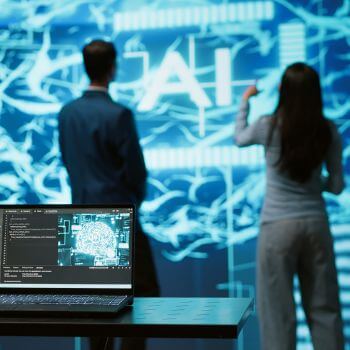
Dr Asieh Hosseini Tabaghdehi
Senior Lecturer in Strategy & Business Economy
Eastern Gateway 104h
- Email: asieh.hosseinitabaghdehi@brunel.ac.uk
- Tel: +44 (0)1895 265263
- Global Management
- Brunel Business School
- College of Business, Arts and Social Sciences
Research area(s)
Asieh’s research focuses on the digital transformation and its far-reaching socio-economic impacts, exploring how emerging technologies shape industries, labor markets, and society as a whole. She focuses on enhancing SME growth through technological innovation, examining how digital tools enable small and medium enterprises to scale, innovate, and remain competitive in an increasingly digital economy. Her work spans several critical sectors, including social care, where she explores how digital transformation can enhance service delivery and equity; supply chain management, analysing how automation and AI drive efficiency and resilience; and environmental sustainability, with a particular emphasis on AI integration for decarbonization and achieving net-zero targets.
In addition, Asieh investigates the future of the labor market, considering how automation and AI reshape workforce dynamics, including job displacement, upskilling, and new job creation. A central theme in her research is the importance of smart data governance, ensuring the ethical, transparent, and responsible use of data by individuals and organisations as it becomes increasingly central to decision-making across sectors. She also focuses on the promotion of ethical AI technologies design and adoption, that prioritize fairness, accountability, transparency, and societal well-being.
Her research further addresses key topics such as emerging technology adoption, automation and the future of work, digital market dominance, and the ethical implications of these transformations. Asieh’s research has been supported through Economics and Social Research Council at UK Research Institute (UKRI) grants.
Research grants and projects
Research Projects
Grants
Funder: National Institutes of Health
Duration: April 2026 - April 2028
Funder: Arts and Humanities Research Council
Duration: November 2025 - October 2028
Funder: Innovate UK
Duration: June 2025 - November 2025
Funder: Economic and Social Research Council
Duration: March 2025 - November 2025
Funder: Economic and Social Research Council
Duration: January 2025 -
Funder: Brunel Public Policy
Duration: -
The rise of fake news and misinformation, fuelled by AI technologies like deep fakes, poses significant risks to democratic processes and societal trust. With elections recently held in 77 countries, including the UK, safeguarding democratic integrity is critical. This research examines how governments and platforms can implement algorithmic reliability standards and ethical regulations to curb the spread of election-related misinformation, addressing voter manipulation and the misuse of AI technologies. Using a narrative literature review, the study investigates the psychological harm (PH) caused by fake news, exploring its characteristics, lifecycle, and societal impact. It synthesises existing research to understand how PH originates, evolves, and spreads, affecting emotional well-being, behaviours, and community dynamics. The study emphasises the need for metrics to evaluate the severity and scope of PH to inform effective interventions. The research highlights the importance of balancing responsible AI use with minimising harm, advocating for ethical AI governance. It underscores the role of transparent and accountable policy frameworks in protecting democratic institutions while fostering trust and informed civic participation. By integrating insights from global elections, the study provides guidance for policymakers and organizations to develop strategies that ensure resilience against misinformation. Supported by Brunel Policy Development Funds, this project contributes to the broader societal goals of equitable access to accurate information, mental well-being, and the preservation of democratic values in the face of rapid technological change. It aims to provide actionable recommendations for promoting trust and integrity in an era shaped by AI.
Funder: Brunel Public Policy Development
Duration: -
This completed research project aimed to advance a sustainable digital ecosystem in Sarawak by integrating community entrepreneurialism with smart city development. The focus was on leveraging local entrepreneurial initiatives to enhance Sarawak’s digital economy, while embracing the potential of emerging technologies to drive community growth. By partnering with Sarawak Digital Economy Corporation (SDEC), the project explored how digital ecosystems can be developed and sustained through inclusive, ethical business models. The project assessed SDEC’s role as a digital ecosystem builder, focusing on improving the uptake and effectiveness of its Business Ecosystem Blueprint. Key objectives included fostering collaboration between stakeholders, exploring how to integrate smart city concepts, and supporting local entrepreneurs with access to digital technologies and business opportunities. Through the Collaborative Transformation Programme, the project gathered insights from two impact-driven events aimed at understanding the ethical dimensions of digital ecosystems. The research focused on ensuring that the rapid digital transformation, driven by smart city technologies, was inclusive, sustainable, and aligned with global Sustainable Development Goals (SDGs). The project outcomes included the development of a framework for ethical digital business practices, stronger relationships among local digital stakeholders, and pilot data that highlighted opportunities for further collaboration and research. This work contributed to increasing the adoption of digital technologies in Sarawak, particularly in the context of smart city initiatives, while promoting a more inclusive and sustainable approach to digital ecosystem development.
Funder: Economic and Social Research Institute
Duration: July 2024 -
Funder: Brunel Business School
Duration: March 2024 - July 2024
The rapid advancement of AI and its role in reshaping the global digital economy underscores the need to address digital addiction's mental health and socio-economic impacts, especially among youth. Excessive screen time and social media usage impair cognitive abilities, interpersonal skills, and productivity, affecting the future workforce. Using a mixed-methods approach, including roundtable discussions with diverse stakeholders, this study seeks actionable insights into mitigating digital addiction's adverse effects.
Funder: Brunel University London
Duration: January 2023 - June 2023
Crowdworking represents a transformative shift in digital employment, providing organizations with flexible and cost-effective access to skilled labor via platforms such as Upwork, Topcoder, and 99designs. While this model offers efficiency and scalability, it also raises critical ethical concerns, including issues of inclusivity, trust, equality, and well-being. The routinization of crowdworking within organizational structures further amplifies these challenges, necessitating careful scrutiny of its impact on traditional employment dynamics and organizational accountability. This research focuses on exploring how organizations can responsibly integrate crowdworking into their operations while addressing its ethical implications. It examines the effects of crowdworking on organizational trust and accountability, compares the experiences of crowdworkers and traditional employees, and identifies potential risks related to equality and worker well-being. The ultimate aim is to develop a framework for assessing responsible crowdworking practices and to provide practical guidelines for organizations to ensure ethical and sustainable implementation. By addressing the broader implications of digital transformation in the workplace, this research advances our understanding of responsible innovation and contributes to shaping equitable and inclusive employment practices in the digital age.
Funder: Economic & Social Research Council
Duration: January 2021 - July 2022
Funder: Brunel University London
Duration: 2020 -
Artificial Intelligence (AI) holds immense potential to transform economies and improve societal well-being. This research focuses on the critical role of responsible AI in fostering equitable access to opportunities, promoting economic transformation, and ensuring sustainability in the digital age. Governments, particularly advanced ones, are urged to leverage AI to maintain global competitiveness, enhance national well-being, and drive inclusive economic growth. In the wake of the COVID-19 pandemic, organizations rapidly adapted to challenges by fostering human-machine collaboration, showcasing the potential of AI-driven innovation. However, this transformation also highlighted the need to address risks associated with an AI-dominated economy. This project investigates the interplay between human and AI-oriented economic systems, exploring how to prevent unintended consequences while maximizing benefits for society and the workforce. Through a mix of qualitative and quantitative methods, this research incorporates insights from businesses, policymakers, and academics. The findings aim to support the development of ethical, unbiased AI frameworks that align with a sustainable and human-centered digital economy. Ultimately, this study contributes to the advancement of responsible AI practices, protecting the integrity of AI-driven societies and fostering a balanced relationship between humans and technology.
Research links
Co-author network
- Dr Pantea Foroudi
- Prof Ashley Braganza
- Dr John Hunter
- Prof Francesco Moscone
- Dr Ozlem Ayaz
- Dr Bryan Mase
- Dr Kevin Lu
- Dr Lefteris Kretsos
- Dr Ming-Yao Jen
- Dr Ramin Behbehani
- Prof Danae Manika
- Prof Dorothy Yen
- Visualise network





